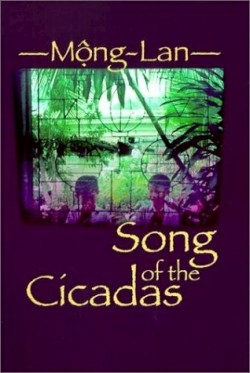Song of the Cicadas
Vietnam is not a pretty place to be, according to
this talented writer, who emigrated to America at a young age after the fall of Saigon. She finds that the United States has its share of problems as well.
From the banks of the Red River in Vietnam to the heights of the Golden Gate Bridge, Ming-Lan’s poetry evokes the vision of an international soul. Images like women doing their washing in the river, a San Francisco professor, and a suicidal mandolin player show how Ming-Lan’s life experience lends her poetic voice a multi-textured reading of her many worlds.
In “The Long Bien Bridge,” Ming-Lan graphically describes the hard life of much of the Vietnamese population around the Red River: “Her older sister / who refuses to marry him / sits near the bridge amassing / vegetables for sale / mounds of mint / hills of water spinach / guavas bananas - the poor man’s fruit / swords of sugarcane / flopping scales like huge tongues / ready to weigh.” The poem’s images-buffalo in the water while children play and women wash clothes, bicycle commuters crossing the bridge-convey a sense of rich life, where resolution carries the day.
This poem contrasts with “The Golden Gate Bridge,” which describes the bridge’s suspension cables and the water underneath with cold precision: “above the bridge / the universe of red rust / thicker than wrists metal cords / pass us lax or hasty as the years / yearly repainted.” The poem also addresses an unnamed suicide, who chose to end life at the bridge.
Other poems, including “Grotto” and “Lake,” suggest that Ming-Lan mourns the passing of pre-industrial (pre-war) Vietnam, and retains some ambivalence about leaving her country. Her Vietnam is fraught with hardship, particularly for women, but is also beautiful in its co-existence with nature and the dignity of the hands-on laborer. The title poem sequence, “Song of the Cicadas,” about the end of a romance, reads: “then I wake up cold / you are nowhere near / but in my lungs ripped out rushing for air / must I stop this voice / is this voice the land’s”
Song of the Cicadas won the Juniper Prize for a first collection of poetry. Given the breadth of her work and her highly descriptive voice, Ming-Lan will surely make more waves in the world of American letters.
Reviewed by
Johanna Massé
Disclosure: This article is not an endorsement, but a review. The publisher of this book provided free copies of the book to have their book reviewed by a professional reviewer. No fee was paid by the publisher for this review. Foreword Reviews only recommends books that we love. Foreword Magazine, Inc. is disclosing this in accordance with the Federal Trade Commission’s 16 CFR, Part 255.


